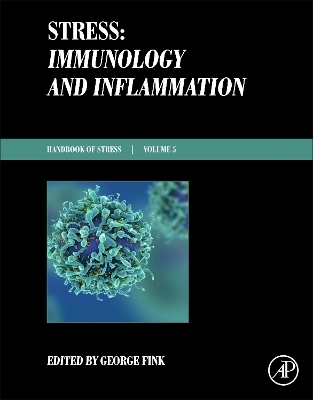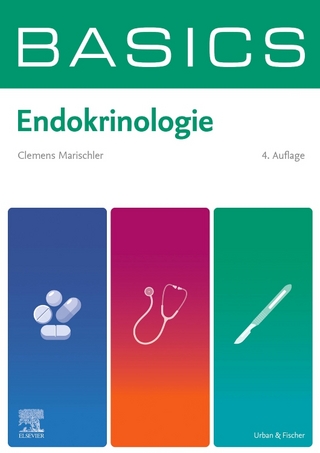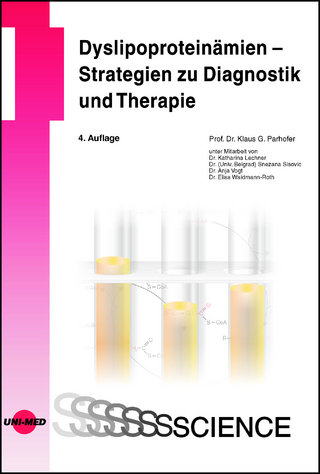
Stress: Immunology and Inflammation
Academic Press Inc (Verlag)
978-0-12-817558-3 (ISBN)
Dr. Fink is Honorary Professor in the University of Melbourne and Professorial Research Fellow at the Florey Institute of Neuroscience and Mental Health. Formerly, he was Scientific Director of the Mental Health Research Institute, Melbourne, Australia. Before returning to Melbourne in 2003, Dr. Fink was University Lecturer in Human Anatomy and Fellow in Physiology and Medicine at Brasenose College and the University of Oxford and served for nearly 20 years as CEO and Director of the UK Medical Research Council’s Brain Metabolism Unit in Edinburgh. He gained distinction through his seminal research discoveries in neuroendocrinology and psychopharmacology published in over 360 scientific papers. Dr. Fink served as President of the European Neuroendocrine Association. His distinctions include Fellow of the Royal Society of Edinburgh, Fellow of the Royal College of Physicians of Edinburgh, Fellow of the Royal Biological Society, Fellow of the Physiological Society, and Honorary Member of the British Society for Neuroendocrinology. Fink was Honorary Professor in the University of Edinburgh, delivered the inaugural Geoffrey Harris Prize Lecture of the British Physiological Society, and the Wolfson Lecture. In 1979 he was awarded the Royal Society - Israel Academy Exchange Fellowship which enabled him to spend a research year at the Weizmann Institute of Science, Rehovot Israel. In 2000 he was awarded the Lifetime Achievement Award of the International Society of Psychoneuroendocrinology. His membership of learned societies includes Emeritus member of the Society for Neuroscience, the Endocrine Society and the Genetics Society of America. Dr. Fink has edited several scientific books with Elsevier, including Stress Science: Neuroendocrinology (2009), Stress Consequences: Mental, Neuropsychological and Socioeconomic (2009), Stress of War, Conflict and Disaster (2010), the Handbook of Neuroendocrinology (2011), and most notably the 4-volume second edition of the Encyclopedia of Stress (2007) on which this new Handbook of Stress series is based. He was founding Editor-in-Chief of the first edition of the Encyclopedia of Stress (2000) which was awarded the 2001 British Medical Association commendation for its contribution to Mental Health. The first volume of his Handbook of Stress series, entitled “Stress: Concepts, Cognition, Emotion, and Behavior, received the BMA High Commendation in the Health and Social Care category as one of the top titles in its discipline.
1. Toward identifying individual stress susceptibility
GAILEN D. MARSHALL AND MATTHEW C. MORRIS
2. Plant immune system: Mechanisms and resilience
VL SIRISHA, SIRSHA MITRA, AND PENNA SUPRASANNA
3. Effects of stress on immune cell distribution
FIRDAUS S. DHABHAR
4. Stress-induced enhancement of immune function
FIRDAUS S. DHABHAR
5. Immune suppression
FRANCESCO CHIAPPELLI, ALLEN KHAKSHOOY, AND JOSH GILARDI
Summary 39
6. SARS-CoV-2 immune suppression
FRANCESCO CHIAPPELLI, ALLEN KHAKSHOOY, AND JOSH GILARDI
7. Interleukin-1 beta in psychosocial stress
WENYUAN YIN, JONATHAN P. GODBOUT, AND JOHN F. SHERIDAN
8. Inflammation and traumatic stress
HIROAKI HORI AND YUKO HAKAMATA
9. Stress in psoriasis
ALLEN KHAKSHOOY, JOSH GILARDI, AND FRANCESCO CHIAPPELLI
10. Natural killer (NK) cells
THERESA L. WHITESIDE
11. Psychoneuroimmunology
ROBERT DANTZER
12. Stress, aging, and inflammation
SARA MATOVIC, CHRISTOPH RUMMEL, MARTIN FELDOTTO, AND JEAN-PHILIPPE GOUIN
13. The chaperone system in autoimmunity, inflammation, and virus-induced diseases: Role of chaperonins
ALBERTO J.L. MACARIO AND EVERLY CONWAY DE MACARIO
14. Steroid hormone receptors and regulation of ACE2 and COVID-19 disease outcomes
MORAG YOUNG AND KAREN CHAPMAN
15. Immune, inflammatory, and neural systems in neuropsychiatric disease
MARCEL BERTSCH-GOUT, ANTHONY T. REDER, AND ROYCE LEE
16. Stress responses modulate bacterial competitive fitness in polymicrobial communities
MING-XUAN TANG, SHERINA DYRMA, AND TAO DONG
17. Mitigating viral invasion: mTORC2’s role in neuroprotection and immunity
IPSITA VOLETY, CHANDRASHEKHAR D. PATIL, AND DEEPAK SHUKLA
18. Microglia regulate cognition and stress-related cognitive disorders
MIOU ZHOU, SHELBI SALINAS, JESSICA CORNELL, AND ALEXANDRA BUI
19. Prenatal-induced psychopathologies: All roads lead to microglia
MAYA LEBOW, YAEL KUPERMAN, AND ALON CHEN
20. The environmental mismatch model of bipolar disorder: The role of stress, gut microbiota, lifestyle factors, and neuroinflammation
MARKUS J. RANTALA AND JAVIER I. BORRÁZ-LEÓN
21. Beta cell stress and type 1 diabetes
EDDIE A. JAMES
22. General adaptation in critical illness 1: The glucocorticoid signaling system as master rheostat of homeostatic corrections in concerted action with nuclear factor-?B
G. UMBERTO MEDURI AND GEORGE P. CHROUSOS
23. General adaptation in critical illness 2: The glucocorticoid signaling system as a master rheostat of homeostatic corrections in concerted action with mitochondrial and essential micronutrient support
G. UMBERTO MEDURI, ANNA-MARIA G. PSARRA, KARIN AMREIN, AND GEORGE P. CHROUSOS
24. Prolonged glucocorticoid treatment in ARDS: Pathobiological rationale and pharmacological principles
G. UMBERTO MEDURI, MARCO CONFALONIERI, DIPAYAN CHAUDHURI, BRAMROCHWERG, AND BERND MEIBOHM
25. The role of stress in mediating inflammation in the context of neurodegeneration
AYEISHA MILLIGAN ARMSTRONG, AMY WOODFIELD, MELISSA ECCLES, DAVID GROTH, AND GIUSEPPE VERDILE
| Erscheinungsdatum | 02.09.2023 |
|---|---|
| Verlagsort | San Diego |
| Sprache | englisch |
| Maße | 216 x 276 mm |
| Gewicht | 1200 g |
| Themenwelt | Medizinische Fachgebiete ► Innere Medizin ► Endokrinologie |
| Naturwissenschaften ► Biologie ► Genetik / Molekularbiologie | |
| Naturwissenschaften ► Biologie ► Humanbiologie | |
| Naturwissenschaften ► Biologie ► Zoologie | |
| ISBN-10 | 0-12-817558-3 / 0128175583 |
| ISBN-13 | 978-0-12-817558-3 / 9780128175583 |
| Zustand | Neuware |
| Informationen gemäß Produktsicherheitsverordnung (GPSR) | |
| Haben Sie eine Frage zum Produkt? |
aus dem Bereich


